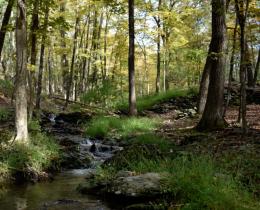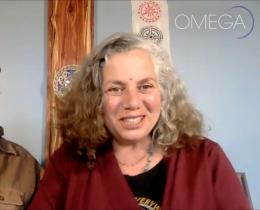Omega: You have said, “We’ve built our economy around a metaphor that has more to do with the Cold War than with life.” Can you explain what you meant?
Janine: The central questions that we try to answer in ecology is, "How do ecosystems assemble? What is the important influencing factor when you look out at a forest, why does it look the way it does? Why are those species together? Why are those individuals spaced the way they are? In other words, how does that society put itself together?"
When ecology as a science started a century ago there were two gentleman, Fredric Clements and Henry Gleason. They presented opposing viewpoints.
Frederic Clements said that ecosystems are communities. They organize themselves and are actually giving each other mutual aid. There’s a reason that these plants grow together. They actually create conditions that are more and more conducive to their living together.
Henry Gleason said, "No; absolutely not." Ecosystems are actually just individuals that are simply responding to the abiotic conditions to the soil type, to the kind of water on that site, to the slope, to the aspect. It’s an individual who says, "I’m gonna grow here for these particular reasons," having absolutely no interaction with the plants around it. They seem to look like they’re in a community, but there’s no such thing.
Until recently, Gleason had won this great debate.
What happened is, up until about 20 years ago, most of the science would look at interaction amongst plants saying, "They’re actually fighting for sunlight; they’re fighting for water; they’re fighting for space; they’re fighting for soil nutrients. They’re spacing themselves out in this competitive way, but they’re really just individuals."
We spent 100 years and a lot of research looking for the data that would say, “Yeah. That explains it.” Well, we couldn’t quite find it. Certainly there was some competition going on, but was it the driving factor? Competition wasn’t the whole story.
This was all going on at the time of the Cold War. So anything that smacked of communism went against our economy paradigm, which was saying, “Dog-eat-dog competition is the way the natural world works.”
We did this also with social Darwinism. We misread Darwin. There was a guy named Herbert Spencer, a political philosopher, who actually said, “Survival of the fittest.” Darwin never did. He said, “Survival of the fit,” meaning fit to your habitat.
And then you had this group of scientists who said, “You know we’ve been doing these studies and it turns out that mutualistic relationships are much more common, prevalent, and have more ecological significance than we thought."
We didn’t know at that time, for instance, that mycorrhizal fungi basically wrap around roots and help a plant or a tree get phosphorus, and the plant or tree gives the fungi carbon. We didn’t realize until very recently that not only do these mycorrhizal fungi help a plant or tree get phosphorus, but that the same mycorrhizal fungi will go to the tree next door and wrap around its roots, and then it will go to the shrub. We do now. We have this evidence.
Since then, mutualism science has really risen and so has facilitation science. So, luckily the people in these fields (ecology, evolutionary, and biology) are now basically saying, “We cannot ignore mutualisms or facilitations."
In fact for conservation purposes, mutualism cascades. In the same way we talk about the wolves and the trophic cascades—the food webs of who eat whom, and if you remove one predator, that’s an issue—now we’re starting to say, “Oh my goodness, what if we remove a mutualist?” It’s very relevant when you talk about agriculture because we have removed unwittingly the fungal helpers in our crops by opening the acts of phosphorus and providing that and so then the fungi doesn’t need to be there.



